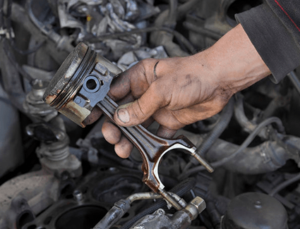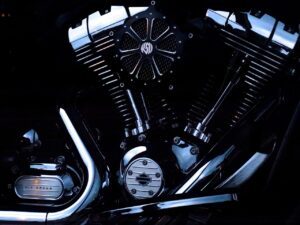How to Detect Engine Knocking Sound

It is very important for every car owner to have a fundamental knowledge of certain, sounds or signs from their vehicle, this can help the driver detect, problems at an early stage, and can troubleshoot them immediately.
When it comes to car troubles and Issues, there’s nothing as distressing as the sound of an engine knocking. whenever you hear the sound it is a sign of huge damage and calls for expensive repairs. in today’s article, we will discuss on how to understand a knocking sound and be able to detect it at an early stage to prevent further damage.
Understanding how to identify this threatening sound and knowing what actions to take next can save you from further engine problems and damage.
What is Engine Knocking?
Engine knocking, also known as detonation, is an abnormal combustion occurrence that occurs within an internal combustion engine. It is known for its knocking or pinging sound, which is similar to that of metallic rattling or hammering, coming from the engine.
Causes of Engine Knocking:
1. Overheating:
Excessive engine heat can lead to engine knocking. When the engine runs extremely hot, it increases the chances of an uncontrolled combustion, causing the engine to knock
2. Incorrect ignition timing:
The ignition timing determines when the spark plug fires to ignite the air-fuel mixture in the car engine. In a case where the ignition timing is too early, the mixture may ignite prematurely, causing the engine to knock.
3. Low octane fuel:
The quality of petroleum products and other liquids which you use in your vehicle are very vital to the health and lifespan of your car engine. Engine knocking can be caused by using fuel with a lower octane rating than what is recommended for your vehicle. Octane rating indicates the fuel’s resistance to pre-ignition. When a low octane fuel is used, there is a likely hood to ignite before the spark plug fires, causing the to engine knocking.
4.Carbon deposits:
carbon deposits which have stayed for a long time can accumulate on the combustion chamber walls, piston tops, or valves. These carbon deposits can become hot spots and cause the air-fuel mixture to ignite prematurely, resulting in engine knocking.
5. High compression:
High compression ratios can increase the temperature and pressure within the combustion chamber in the engine, thereby increasing the chances for the engine to knock.
Impact of engine knocking on your vehicle’s performance:
1. It can reduce power and performance:
Engine knocking can cause a loss of engine power and overall performance. The knocking affects the combustion process, resulting in reduced efficiency and acceleration.
2. Engine damage:
Engine knocking can lead to serious damage to the car engine. The repetitive hammering can cause repair wears on the pistons, piston rings, cylinder walls, and connecting rod bearings. This can result in reduced engine life and expensive engine part replacement.
3. Increased fuel consumption:
When engine knocking occurs, the combustion process becomes less efficient. As a result, the engine may begin to consume fuel more than usual. This makes it expensive for the car owner to operate.
4. Emission problems:
Engine knocking can also affect vehicle emissions. Incomplete combustion caused by knocking can increase the emission of harmful pollutants, such as nitrogen oxides (NOx) and unburned hydrocarbons (HC), contributing to environmental pollution.
Recognizing the Engine Knocking Sound:

Engine knocking is a discerning sound that occurs when the air-fuel mixture in the combustion chamber of an internal combustion engine ignites prematurely or incompletely combustion. It is important to differentiate engine knocking sound from other common engine noises to be able to diagnose and address the implicit issues.
Understanding the different types of engine knocking can help diagnose and address specific issues. Here are a few common types of engine knocking:
1. Detonation knock:
The detonation knock occurs when the air-fuel mixture ignites prematurely or in multiple flame fronts, in the combustion chamber. It sounds like a sharp metallic knock this can lead to severe engine damage if not resolved immediately. Detonation knock is caused by factors like low-quality fuel, excessive engine load, or incorrect ignition timing.
2. Pre-ignition knock:
Pre-ignition knock occurs when the air-fuel mixture ignites before the spark plug fires. It sounds like a pinging or knocking sound and is mostly caused by hot spots in the combustion chamber, such as carbon deposits or overheated spark plugs. Pre-ignition knock can result from issues like incorrect spark plug heat range, overheating engine, or carbon buildup.
3. Rod knock:
The rod knock is a deeper and more sensitive knocking sound that arises from a problem with the engine’s connecting rod bearings. It happens when the bearings wear out or become badly damaged, leading to excessive clearance between the rod and the crankshaft. Rod knock is commonly heard during acceleration or under heavy engine loads.
When to listen for the knocking sound during driving :
To be able to correctly identify engine knocking sounds, it’s important to listen for the sound in different driving conditions. Here are a few examples of case scenarios where you should pay attention to the knocking sound:
1. During Acceleration:
Engine knocking is mostly more noticeable during acceleration or heavy load conditions. while accelerating pay attention to any abnormal knocking sounds as you step on the gas pedal and the engine revs up. If you hear a knocking sound during acceleration, it could indicate detonation or pre-ignition.
2. During Deceleration:
While lifting off the throttle or when decelerating, listen for any knocking sounds that is consistent. Although engine knocking is less noticeable during deceleration, it is critical to be attentive to any abnormal noise as they can still provide valuable information.
Remember, if you consistently hear an engine knocking, it is important to have your vehicle urgently checked and inspected by a qualified mechanic. Ignoring engine knocking can lead to heavy engine damage and costly repairs if left unattended to.

How to resolve Engine Knocking:
When you encounter or notice an engine knocking, it’s important to take this immediate action to prevent further damage to your car engine. Here are some steps you should follow immediately:
1. Reduce the engine load:
If you notice knocking while accelerating reduce the load on the engine by easing off the throttle. This can help stop the knocking temporarily.
2. Use higher octane fuel for your engine:
Try switching to a higher-octane fuel, such as premium gasoline. Higher octane fuels have better resistance to premature ignition, which can help prevent chances of engine knocking.
3. Avoid aggressive or reckless driving:
Engaging in aggressive and reckless driving, such as hard acceleration or hitting the brakes suddenly, can increase the chances of engine knocking to occur. Drive smoothly and avoid putting excessive stress on the engine of your car.
4. Always check the engine oil level:
Low engine oil levels can contribute to engine knocking. always Check your engine oil level using the dipstick and top up if it is below gauge level. Use quality and recommended by the manufacturer.
5. Let the engine cool:
If the knocking persists, it’s advisable to stop driving and let the engine cool down for some time. Excessive heat can increase knocking and potentially cause severe damage to the engine.
6. Check for carbon deposits:
Carbon deposits on the cylinder walls, pistons, or spark plugs can lead to knocking. Making use of a fuel system cleaner or using a specialized additive to your fuel may help remove these carbon deposits and limit the knocking.
7. Inspect the spark plugs:
Worn-out spark plugs can cause engine knocking. Remove the spark plugs and inspect their condition,If they appear to be dirty, fouled, or worn out, replace them with new ones immediately.
8. Clean the EGR system:
The Exhaust Gas Recirculation (EGR) system can become blocked with carbon deposits, affecting engine performance and causing engine knocking. Cleaning the EGR valve and related components may help revert the issue.
9. Engine diagnostics:
A professional mechanic can use specialized automobile diagnostic tools to figure out the exact cause of the engine knocking. checking fuel delivery systems, and deep examination of engine components.
10. Replacement Engine component affected :
Depending on the outcome of the diagnosis, the mechanic may recommend replacing faulty components such as the knock sensor, fuel injectors, or worn-out bearings. This can help deal with the knocking issue. This involves disassembling the engine, inspecting and replacing damaged parts, and reassembling it to proper functioning mode.
FAQ:
Q1. What is the sound of the engine knocking?
A1. Whenever you hear continuous tapping or pinging sounds that occur louder as you step on accelerate that is a sound of the engine knocking
Q2. Can low-quality fuel cause engine knock?
A2. Yes, low-quality or improper fuel can contribute to engine knocking. It is important to use fuel with a high octane rating for your vehicle to avoid potential knocking issues.
Q3. Is engine knocking repairable at home, or should I always consult a professional?
A3. in simple or less complex cases of engine knocking, it can be resolved through Doing It Yourself troubleshooting and fixes, such as replacing faulty spark plugs or using fuel additives. However, for more complex or persistent knocking issues you should contact your mechanic for proper diagnosis.
Q4. Can engine knocking be prevented altogether?
A4. A very significant means to avoid knocking is by proper vehicle maintenance, using high-quality fuel, and regular inspections etc.
Q5. How much does it cost to repair engine knocking?
A5. The cost of repairing engine knocking can differ significantly depending on the cause and the extent of the damage. changing faulty or damaged parts can cost slightly above 100,000 naira, while in cases where a new engine is needed budget at least 300,000 naira.
In summary, engine knocking is not an issue to be joked with. By understanding the characteristics of engine knocking, and actively listening for the sound, you will be well prepared to take the necessary steps of action to resolve it immediately. Remember, when it comes to engine knocking, early detection and proactive measures are crucial. By becoming familiar with the sound, causes, and appropriate actions to take, you can safeguard your vehicle’s engine and enjoy a smooth, trouble-free driving experience.
